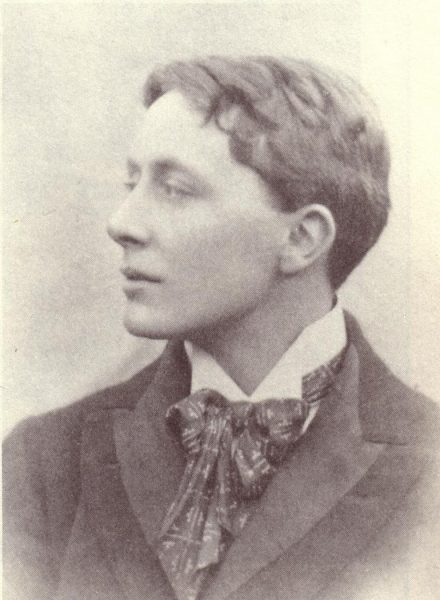 The Picture of Dorian Gray by Oscar Wilde
The Picture of Dorian Gray by Oscar Wilde
My rating: 5 of 5 stars

English poet and Dandy, John Gray. As a writer, Gray is best-known for Silverpoints, The Long Road, and Park: A Fantastic Story. Though celebrated in his day, today he is perhaps best known for being the rumored inspiration for Oscar Wilde’s fictional character and literature’s most famous Decadent and Dandy, Dorian Gray.
***Warning: Plot rotters ahead!***
When they entered, they found hanging upon the wall a splendid portrait of their master as they had last seen him, in all the wonder of his exquisite youth and beauty. Lying on the floor was a dead man, in evening dress, with a knife in his heart. He was withered, wrinkled, and loathsome of visage. It was not till they had examined the rings that they recognized who it was.
Friends, whatever you do, think twice before deleting that selfie! Unless, of course, you are certain it does not contain your soul. Personally, I wouldn’t risk it.
Dorian Gray surprised me! I had managed to get this far in life with only catching vague, humorous references to paintings rotting in attics, so I had no idea how rich and complex and devastating this novel is. Up until now, I was familiar only with Wilde’s plays and poems. I read this classic as if it were a thriller. I couldn’t put it down and felt my jaw clenching as I turned the pages. Having said that, my favourite paragraph was a simple, descriptive one:
There was a silence. The evening darkened in the room. Noiselessly, and with silver feet, the shadows crept in from the garden. The colours faded wearily out of things.
Gorgeous writing, as is the rest of the book. In fact, I think this short novel, like its ill-fated painting, is aesthetic perfection.
I have to say, Lord Henry drove me spare. I suppose he was meant to, being the Devil incarnate, but I became impatient with his constant barrage of upside-down aphorisms. What a cold cold cold man:
No, she will never come to life. She has played her last part. But you must think of that lonely death in the tawdry dressing room simply as a strange lurid fragment from some Jocobean tragedy . . . The girl never really lived, and so she has never really died. To you at least she was always a dream, a phantom that flitted through Shakespeare’s plays and left them lovelier for its presence, a reed through which Shakespear’s music sounded richer and more full of joy. The moment she touched actual life, she marred it, and it marred her, and so she passed away. Mourn for Ophelia, if you like. Put ashes on your head because Cordelia was strangled. Cry out against Heaven because the daughter of Brabantio died. But don’t waste your tears over Sibyl Vane. She was less real than they are.
Honestly, I could not bear to sit through an hour with Lord Henry, let alone an entire evening. I found him a tedious bore, forever showing off, in his world-weary way, his grasp of irony via verbal acrobatics. No one stopped to notice that at least two-thirds of what he said was utter bollocks. All readers, I would guess, love repartee between clever characters but, in the case of Henry, birdying his friends’ sentences back at them in an endless badminton of parody and paradox seemed to be his sole mode of communication. Dorian, though, is a tragic figure, like a Greek hero, so one could feel for him even in his worst moments because it was clear from the beginning that he was doomed.
I did not realise how deeply philosophical Dorian Gray is, nor how unsubtly homoerotic (for its era) and overtly misogynistic (for any era). Despite Dorian’s claiming repeatedly to fall in love with women, he is obviously indifferent to them as human beings and seems much more interested in spending his time with attractive young men. Lord Henry is much the same, only the worse misogynist. He enjoys women who amuse him but hasn’t much good to say about any of the sex.
That awful memory of women! What a fearful thing it is! And what an utter intellectual stagnation it reveals! One should absorb the colour of life, but one should never remember its details. Details are always vulgar.
In fact, our artist who creates the famous painting, Basil Hallward (whom I keep wanting to call Hardwood!) is similar to Henry and Dorian in his commitment to aestheticism and his sensuality, but he is a far kinder man who has scruples.
I really cannot recommend this book highly enough for the quality of its writing, its moral argument (which is compelling but ambiguous), and its beauty. Now, I must read Against Nature, or I will feel forever that I have missed something important about Dorian Gray. Hopefully, it won’t poison me or make me any more decadent than I already am!
A feeling of pain crept over him as he thought of the desecration that was in store for the fair face on the canvas. Once, in boyish mockery of Narcissus, he had kissed, or feigned to kiss, those painted lips that now smiled so cruelly at him. Morning after morning, he had sat before the portrait wondering at its beauty, almost enamoured of it as it seemed to him at times. Was it to alter now with every mood to which he yielded? Was it to become a monstrous and loathsome thing, to be hidden away in a locked room, to be shut out from the sunlight that had so often touched to brighter gold the waving wonder of its hair? The pity of it! the pity of it!
